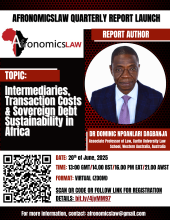Sovereign Debt News Update No. 153: The Afreximbank-Zambia Debt Dispute: A Precedent-Setting Standoff
Following its 2020 default on its US$42.5 million Eurobond payment, Zambia became the first African country to experience a sovereign default during the COVID-19 pandemic. Since then, it has been engaged in a protracted effort to restructure its debt, notably under the G20 Common Framework. This Update explores the divergent positions in this dispute and situates the debate within the broader context of the evolving role of regional multilateral development banks in sovereign debt restructuring. It will also examine Zambia’s strategy of third-party subrogation of Afreximbank’s debt and assess whether it offers a viable path forward in resolving its debt crisis and furthering the relevance of African Multilateral Development Banks in the long-term.

